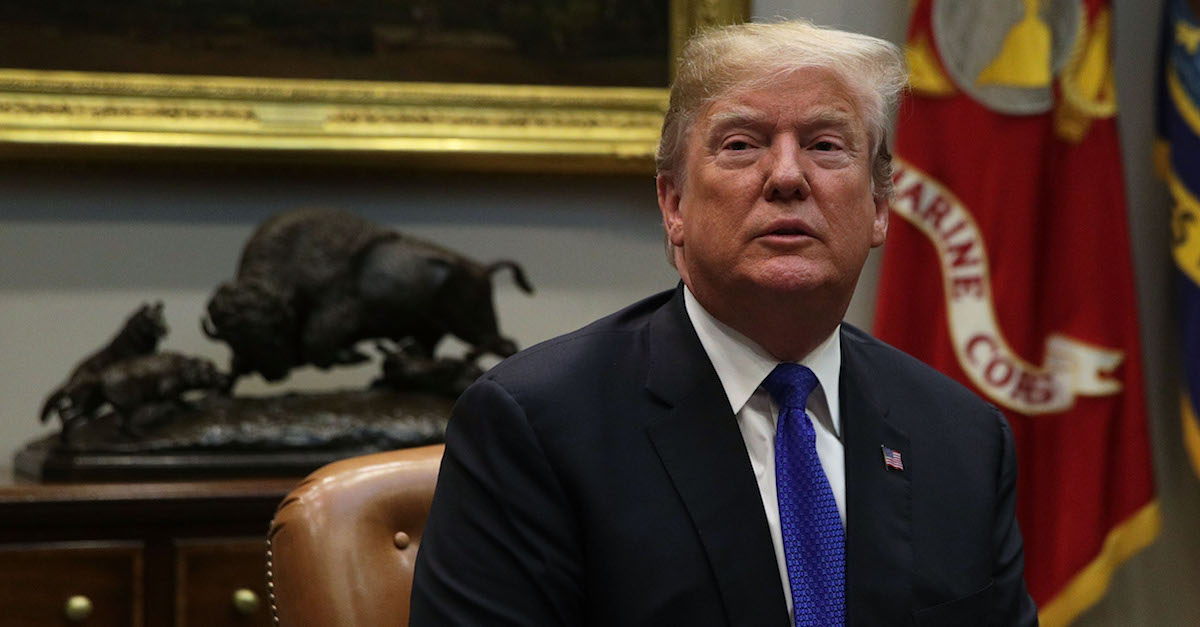
The U.S. Department of Justice (DOJ) has responded to the Knight First Amendment Institute’s lawsuit regarding President Donald Trump‘s blocking of people on Twitter. The DOJ is arguing that Trump’s practice is not a violation of the First Amendment and that Trump has the power to basically block whomever he pleases.
The plaintiffs have been named as Knight First Amendment Institute at Columbia University, Rebecca Buckwalter, Phillip Cohen, Holly Figueroa, Eugene Gu, Brandon Neely, Joseph Papp, and Nicholas Pappas. All of the individuals named were at one point blocked by the president.
The DOJ said it would be appealing U.S. District Judge Naomi Reice Buchwald‘s decision from May 2018 in the Southern District of New York that said Trump could not block people on Twitter; this is that appeal.
The DOJ argued that “Donald Trump’s blocking of certain Twitter users from @realDonaldTrump is private action concerning a personal account” and that “@realDonaldTrump is a vehicle for disseminating Donald Trump’s own speech, not a forum designed to facilitate the speech of others.”
Argument 1
The DOJ said that, despite Buchwald’s holding, Trump’s personal Twitter account “did not become government-owned or government-controlled property when he became President,” even if White House Director of Social Media and Assistant to the President Daniel Scavino has “exercise[d] control over ‘various aspects’ of the @realDonaldTrump account.”
The Justice Department contends a Trump Administration employee’s influence doesn’t make the account “governmental.”
“That holding is fundamentally misconceived,” the DOJ said.
The DOJ also said that the @realDonaldTrump account identifying Trump as president “does not transform that privately-owned account into a government-controlled one.” They pointed to accounts of former presidents Barack Obama, George W. Bush and Bill Clinton as proof of argument:
Indeed, Barack Obama’s current, private Twitter describes him as “Dad, husband, President, citizen”; George W. Bush’s current, private Twitter page describes him as “43rd President of the United States”; and Bill Clinton’s current, private Twitter page describes him as “42nd President of the United States.”
The DOJ goes on to say that if a president issued “public statements or conduct[ed] official business” at his private residence — let’s say, Mar-a-Lago — this does not transform that residence into government property:
A President’s private residence does not become government property when the President issues public statements or conducts official business there. So too, Donald Trump’s decision to tweet about official matters cannot transform his private Twitter account, which he uses as a platform to disseminate his views on a wide range of topics, into a government-controlled forum.
“For the reasons already given, the district court was wrong to think that the @realDonaldTrump account is controlled by the federal government,” the DOJ said, putting a bow on that portion of its response.
Argument 2
The second major argument in the appeal is that Twitter is not a public forum and therefore there is no First Amendment violation.
The DOJ called this it “fundamentally misconceived premise that @realDonaldTrump is a ‘forum’ intended to facilitate the private expression of others.” Rather, they say it is Trump’s “vehicle” to disseminate his personal speech.
“The ‘intended purpose’ of the account was not to provide an opportunity for other Twitter users to communicate to or about Donald Trump, but rather to provide him with an opportunity to communicate to them,” the DOJ said.
“When one individual replies to another in the physical world, no one would think the ability to reply is itself a ‘forum,'” the appeal says. “[T]he only material impact that blocking has on the individual plaintiffs’ ability to express themselves on Twitter is that it prevents them from speaking directly to Donald Trump by replying to his tweets on the @realDonaldTrump web page.”
The DOJ said that’s not a First Amendment violation because the “U.S. Supreme Court has made clear, ‘[a] person’s right to speak is not infringed when the government simply ignores that person while listening to others.'”
The argument ended with an analogy that says a president declining to hear a person at an auditorium who has made “hostile remarks” is not something anyone would “seriously suggest” amounts to stripping that person of their First Amendment right.
By way of physical analogy, suppose that a President gives a speech before a large audience in an auditorium, and then entertains questions and comments from the audience after his remarks. He chooses to pass over one member of the audience who has previously made hostile remarks. While the passed-over member remains free to say whatever he wants outside the auditorium, the President’s decision not to hear from him effectively denies the individual the opportunity to be heard by the President’s large audience within. Yet no one would seriously suggest that the audience member’s constitutional rights have been violated or that the First Amendment obligates the President to call on him. The First Amendment entitles him to speak; it does not entitle him to borrow the President’s audience for his remarks. And again, this is especially true if the auditorium is the President’s personal property, over which he retains a private, not governmental, right to exclude.
[Image via Alex Wong/Getty Images.]
Have a tip we should know? [email protected]